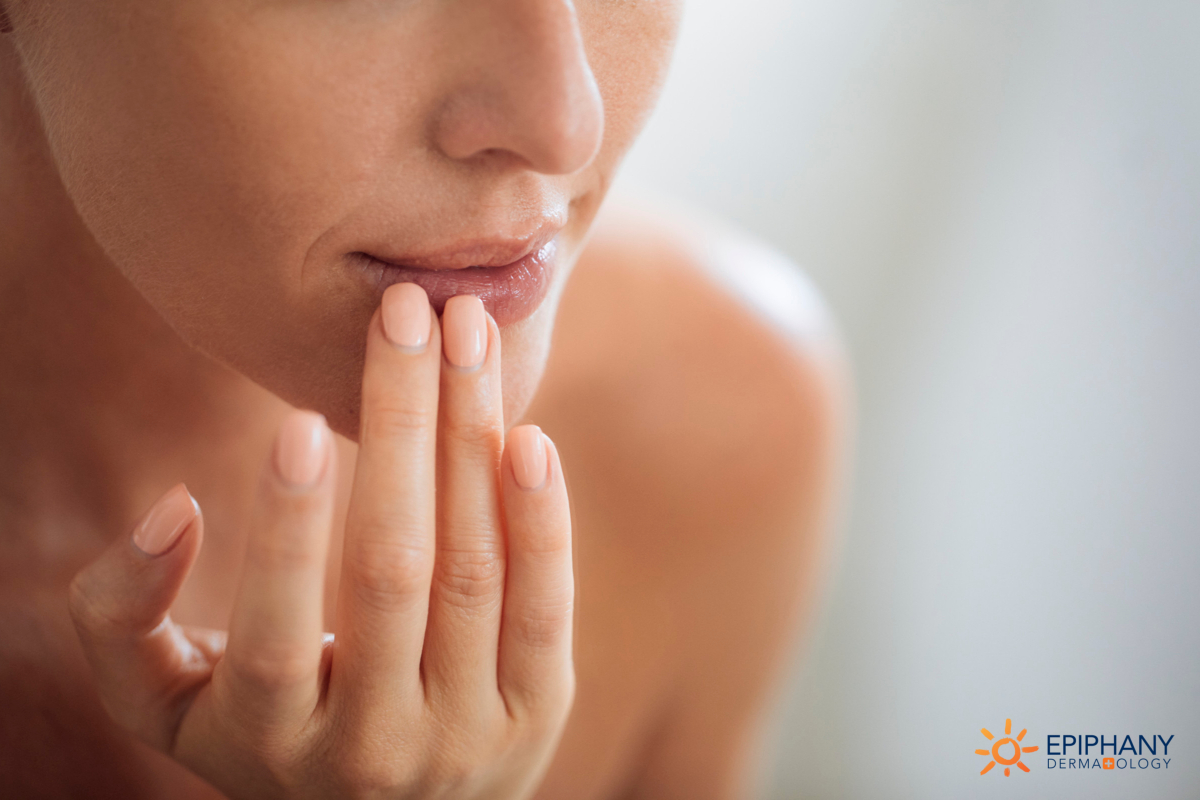You already know you’re supposed to wear sunscreen every day. And even if you’re not applying it separately, many cosmetic companies are adding it to your foundation and moisturizer, making it much easier to work sunscreen into your routine.
But what about sunburned lips? Is sunscreen for lips really necessary or can our lips handle sun exposure better than the rest of our skin?
Can Lips Really Get Sunburned?
Lips seem to behave a little differently to the sun than the rest of our face, but they’re still susceptible to sunburn. The structure of the skin is the same, but it’s more vascular, meaning there are more blood vessels and an increased blood supply to your lips compared to other areas of skin. That’s why your lips have a pink or purple color.
However, they still have the same layers and basic components as the rest of your skin. Lips are protected by the epidermis, the outermost layer largely composed of keratinocytes.
The lower lip may even need extra protection, as you are more likely to develop a skin cancer on lower lip than upper. The lower lip is more prone to sunburn as it protrudes from the face and gets more sun exposure. As with any body part, increased UV radiation can damage the skin cells DNA over time, and can lead to development of cancerous cells.
What Happens When My Lips Burn?
Not every burn results in a sun blister on your lip. Sometimes lips feel sensitive after a burn; other times they blister and peel. There are different severities of sunburn on your lips, much like the rest of your skin. But you can’t rely on color change alone to know how bad the burn really is. Here’s how you know the severity of your sunburned lips.
First-Degree Sunburned Lips
With a first-degree burn, lips are mildly irritated. You don’t see a change in color, but you’ll notice more sensitivity. You may feel your lips are drier than usual, may sting or feel a burning sensation. Also, sucking through a straw, chewing, or talking can be mildly uncomfortable with a first-degree lip sunburn.
If you have a mild sunburn on your lips, your face is likely sunburned as well. As you apply aloe vera or another soothing product to your face, apply it to your lips as well to ease the discomfort and speed up recovery.
As your lips heal, you may notice a little peeling as the dead skin cells flake off.
Second-Degree Sunburned Lips
With a second-degree sunburn, you may notice blisters on your lips. Blisters indicate a deeper burn. Of course, we want to avoid sunburns, but be especially careful to protect yourself from blistering burns. The more times you experience a second-degree burn, the more susceptible you are to developing skin cancer down the road.
Is the Sun Blister on My Lip Cancerous?
Not every blister on your lip is cancer, but a blister that won’t heal is a red flag. The number one skin cancer on the lips is squamous cell carcinoma. We first see its indicators in a pre-cancer stage of actinic keratosis, which looks like a red, scaly spot that won’t go away. If you pick or bite at a blister and it keeps coming back, that’s a bad sign. Skin cancer doesn’t go away on its own.
It’s important for you to visit your dermatologist annually. As your practitioner examines your face, bring long-lasting blisters to their attention. Tell them, “Hey, this little blister on my mouth hasn’t gone away.”
We always evaluate cold sores (which are not related to UV radiation or sun damage). Cold sores are simply a virus, but they can be activated by sunshine or stress. To the untrained eye, it’s hard to differentiate a cold sore from a sun blister from a precancerous lesion.
If you have a cold sore that won’t heal or a sun blister that doesn’t seem to fade, ask your dermatologist to check it out. If it’s cancerous, you want to catch it early.

How to Choose Sunscreen for Lips
Sometimes lip burns are less obvious than other burns, but it makes sunscreen application no less important. Use an SPF 30+ on your lips daily… or apply a chapstick with sunscreen in it.
You should already be applying SPF 30+ to your face every day. The same sunscreen can work on your lips too! I use CeraVe SPF 30 moisturizing lotion and apply it to my entire face, lips included, each morning. For extra comfort to your lips, add a layer of vaseline or chapstick as a barrier that seals in the moisture.
Some people prefer a chapstick with an SPF in it. That works well too. Consider Aquaphor Lip Repair + Protect (which contains added sunscreen). Some lip balm + sunscreen combos feel waxy or even make your lips feel drier. If you experience this, opt for a regular sunscreen underneath your lip product.
What If I’m Not Sunburned But My Lips Are Still Dry?
Not all lip irritations are caused by a sunburn. If you’re experiencing chronically dry lips, try these tips:
Hydrate!
Never underestimate the effect of hydration on the health of your lips. Hydration is critical. If your lips are chapped or otherwise irritated, it may not be a sunburn. You may be dehydrated. The first place in your body to dry out is the lips because the skin is thinner.
Drink at least ten glasses of water a day and minimize caffeine to stay hydrated. Even your morning coffee could be setting you up for dehydration if you’re not consuming enough water to offset it.
Your toothpaste may be to blame. Many companies add extra chemicals to the toothpaste for a ‘whitening effect’ that can be irritating to lips, causing a burning or stinging sensation. Avoid cinnamon or mint flavors as they tend to be the most irritating.
Use a Petroleum-Based Lip Product
Sometimes regular chapstick isn’t enough to combat the dryness in your lips. Switch to a petroleum-based lip product if you need more moisture.
We recommend Aquaphor — it’s a petroleum-based product that contains ceramides to help repair the skin barrier. If your skin is cracked, irritated, or chapped, Aquaphor works great. Vaseline or petroleum jelly can also be useful in sealing in the moisture your lips need.
Talk to Your Doctor About Medication
If your lips are severely inflamed or irritated, you might be dealing with an inflation or yeast problem.
For severe inflammation, your dermatologist may prescribe a mild topical steroid like a hydrocortisone or Desonide. This condition occurs when saliva gets stuck in the corners of your mouth or if you’re excessively licking your lips. Saliva is an irritant to the skin, so we have to reduce that inflammation with a topical steroid.
Yeast or fungus build-up may be another explanation for your lip irritation. Fungus grows best in wet, dark, moist areas like the corners of the lips. If the corners of your lips are not healing, you may need a topical antifungal medication.
Give Your Lips the Care They Need
Just because lips are a small part of the body doesn’t mean they don’t need special care — lips need care like any other area of the skin. They require regular sunscreen application and regular checkups from the dermatologist.
If your lips feel irritated after being outside, apply a soothing petroleum-based product or aloe product to help them heal, and be more intentional about protecting your lips from sun exposure in the future.
Make lip sunscreen a part of your daily routine and always keep a close eye on cold sores or blisters that develop around your lips. If you have a sore that doesn’t seem to go away or prolonged lip irritation, talk to your dermatologist today.

Andrea McLin is a board-certified physician assistant in Coppell and Saginaw, TX. An active member of the American Academy of Physician Assistants, the Society of Dermatology Physician Assistants, and the Texas Academy of Physician Assistants, Andrea has over 7 years of experience and a special interest in acne, rosacea, and skin cancer prevention and treatment. In her spare time, she enjoys camping, scuba diving, and cheering for the University of Kansas Jayhawk basketball team.
Learn more about Andrea McLin.

